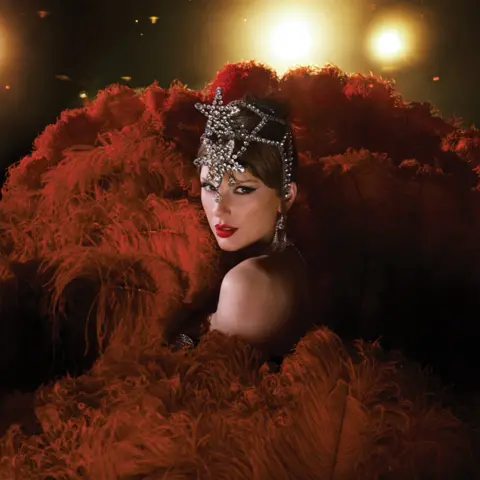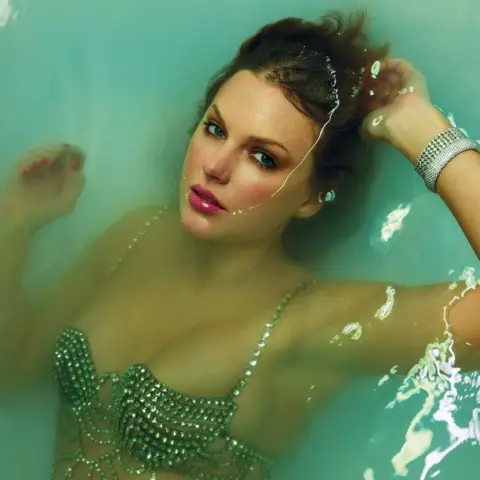Mark SavageMusic correspondent
 TAS Rights Management
TAS Rights ManagementThe last time we met Taylor Swift, she was spiralling.
Her last album, The Tortured Poets Department, was an emotional purge – a stunned post mortem of two bitter, messy break-ups.
We found her at her lowest, “crying at the gym” and “pissed off” at wasting her youth on a six-year relationship with British actor Joe Alwyn, that ultimately fizzled out.
Eighteen months later, she’s back with the latest update from her bureau; and the story is very different.
Recorded in stolen moments during the record-shattering Eras tour, it finds the 35-year-old happy, energised and newly in love with American Footballer Travis Kelce.
“This album is about what was going on behind the scenes in my inner life during this tour, which was so exuberant and electric and vibrant,” she said in an appearance on Kelce’s New Heights podcast last month.
To capture that dynamic, she produced the album not with her longtime collaborator Jack Antonoff – whose pillowy productions defined the sounds of Midnights, and Tortured Poets Department – but with Swedish pop masterminds Max Martin and Shellback, who previously worked with Swift on hits like Shake It Off and I Knew You Were Trouble.
The goal, said Swift, was to make a tight, compact album of “bangers” (that’s hit songs, not sausages) with “melodies that were so infectious that you’re almost angry at it”.
But enough preamble. Is The Life of a Showgirl a rhinestone-studded success, or a chorus line catastrophe?
 Max Martin / Instagram
Max Martin / InstagramGetting straight to the point: It’s a triumph.
It is a combination of compelling songwriting and whip-smart production that easily clears the high bar Swift has set for herself.
Fans expecting a return to the maximalist pop of Red and 1989 might be surprised.
Swift’s new music is more cool and collected than her previous collaborations with Martin; tapping into the atmospheric textures of his recent hits for The Weeknd and Ariana Grande.
But there’s not an ounce of fat on any of these songs.
At 41 minutes, The Life of A Showgirl is the shortest album Swift has released since her debut in 2006; and the laser focus is a welcome relief after the bloated word soup of Tortured Poets.
 TAS Rights Management
TAS Rights ManagementThematically, Swift’s latest lyrics have two distinct threads.
Half of the album’s 12 songs are about falling completely, goofily, head over heels in love. The rest tackle the seedy underbelly of fame.
Along the way, we get some classics, like the image of a burlesque dancer “glowing like the end of a cigarette”; or comparing a critic’s barbs to “a toy chihuahua barking from a tiny purse”.
Elsewhere – and I can’t believe I’m writing this – there’s an entire song filled with playground innuendo.
 Getty Images
Getty ImagesThe album opens, however, with a misdirect.
Fans assumed that The Fate of Ophelia would tether Swift Shakespeare’s story of a noblewoman who drowns in a fit of mania after being driven mad by grief.
Instead, she sings about being “saved” from that fate by Kelce, in a crisp pop track that’s packed with cute references to their relationship – including the Kansas City Chiefs, and the number 100 (the sum of Kelce’s jersey number, 87, and Swift’s lucky number 13).
“I heard you calling on the megaphone,” she says, acknowledging how their romance began with Kelce publicly declaring his affection on his podcast in July 2023.
“If you’d never come for me, I might have drowned in the melancholy.”
Musically, the song plays a clever trick by adding an extra bar at the end of every other phrase, as though Swift is lingering in the moment, too swept up in her feelings to continue.
The album is peppered with little flourishes like that – and it’s supremely satisfying.
 TAS Rights Management
TAS Rights ManagementThe lovestruck theme continues on Opalite, whose breezy chords and Abba-esque harmonies unfurl like a blossoming romance; and Wi$h Li$t, where Swift extricates herself from the Hollywood pack for a life of domestic bliss.
“They want that critical smash Palme d’Or and an Oscar on their bathroom floor,” she observes. “I just want you“.
(Plus “a couple of kids” with “a best friend who I think is hot”).
But perhaps the most eye-opening tribute to Kelce is Wood – a staccato dance track, complete with a Jackson 5 guitar riff, that’s essentially an extended double entendre.
Therein, we find Swift superstitiously “knocking on wood” that their relationship will last, and knocking wood in the bedroom, in an unexpected homage to her fiancé’s “manhood”.
It’s so silly and unexpected that I laughed out loud.
The same thing goes for Actually Romantic, a fantastically sarcastic track about a fellow pop star (unnamed), who calls Swift a “boring Barbie” and writes songs about how much they hate her.
Over grungy guitars and a slapping drum beat, Taylor taunts them with a touch of reverse psychology.
“It sounded nasty but it feels like you’re flirting with me,” she trills. “All the effort you’ve put in, it’s actually romantic.”
She continues to settle scores on Father Figure – the scathing story of a backstabbing protégé, that interpolates the George Michael classic of the same name.
Fans will go wild trying to uncover the subject’s identity, but, to me, the song feels more like a morality tale about a music industry Svengali, who possesses the power to wipe out anyone who isn’t “loyal to the family”.
Full of cinematic strings and disorientating key changes, it sits alongside No Body, No Crime, Bad Blood and Vigilante S*** in Swift’s expanding catalogue of revenge anthems.
 Getty Images
Getty ImagesThe album’s best track, however, is the soft-focus ballad Ruin The Friendship.
Time-travelling to Swift’s high school days in Tennessee, it reminisces about a boy she confined to the friend zone while yearning for a single kiss.
Delicate and nostalgic, it takes a heart-wrenching turn in the third verse, when Swift’s real life best friend Abigail calls to say their former schoolfriend has died, and she flies through the night to attend the funeral.
In an album that’s largely concerned with contentment, the regret and sadness hit doubly hard.
The collection ends with the title track, a spirited duet with Sabrina Carpenter that doubles as a cautionary tale about stardom.
It’s the only song that really leans into the showgirl concept, with a percussive tap-dancing interlude and ostentatious key changes, as the stars trade lines about their cut-throat industry.
“All the headshots on the walls of the dance hall / Are of the bitches who wish I’d hurry up and die,” Swift sings.
Then the punchline: “But I’m immortal now, baby doll.”
That feels like a deliberate call-back to Look What You Made Me Do, written in 2017 when Swift was at her most embattled, following a public showdown with Kanye West and months of negative press.
Back then, she sang: “The old Taylor can’t come to the phone right now… Why? Oh, cause she’s dead.“
In 2025, with the world at her feet, Swift can finally say with certainty that her place in pop history is guaranteed.
The Life of a Showgirl is her well-earned victory lap.
Source link



